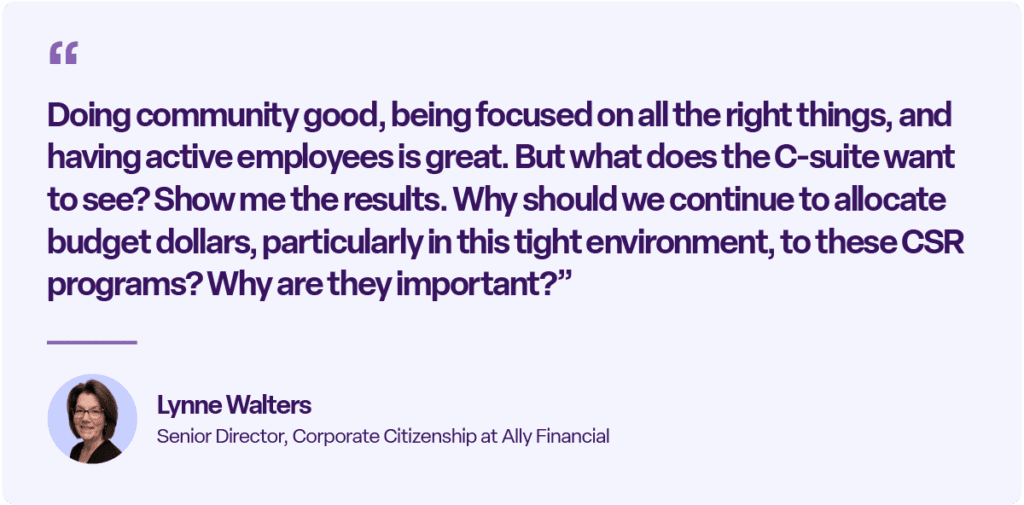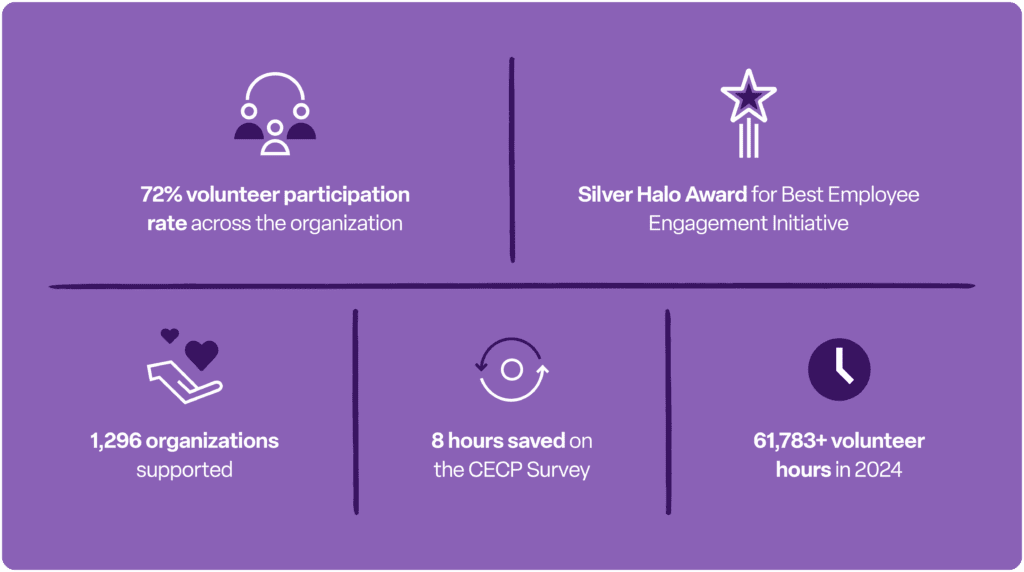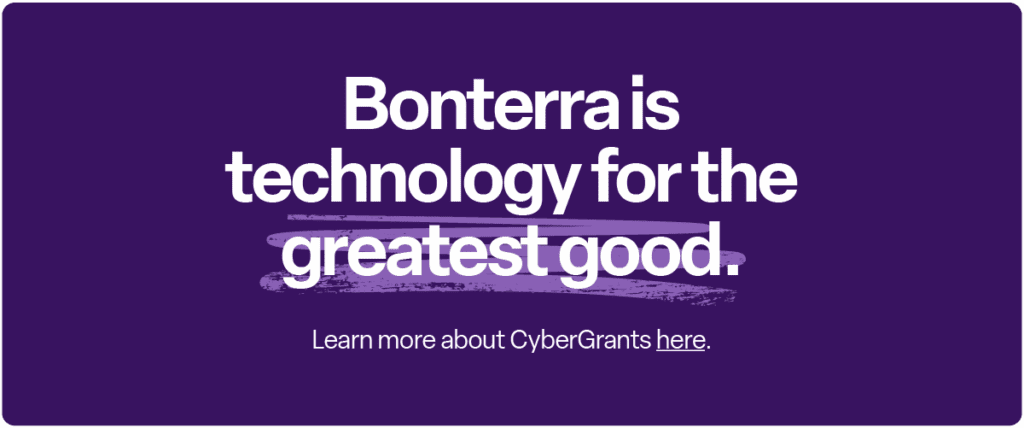Ally Financial secures continued investment in CSR initiatives through data-backed storytelling

Overview
Fostering a culture of giving back
Ally Financial is a leading digital financial services company offering financial products for consumers, businesses, automotive dealers and corporate clients. The Corporate Citizenship team’s goals to support economic mobility, encourage acts of volunteerism, and advocate for diversity and inclusion are all a part of Ally’s greater mission to spark positive change and make a social impact on the world.
Customer profile
Product: CyberGrants Employee Engagement, using Insights reporting feature
Sector: Corporate
Vertical: Financial services
Through grantmaking, employee engagement initiatives, and partnerships with business units and nonprofit organizations, Ally has contributed to a variety of environmental, social, and governance (ESG) causes. The firm has reinforced a culture of giving back through its contribution matching programs and continued promotion of volunteer opportunities, enabling employees to make meaningful contributions in the communities where they live and work.
Challenges
With a small but determined Charitable Operations & Employee Engagement team, Ally needed to manage a growing suite of programs and expectations using limited internal resources.
Ally’s executive leadership team has long supported and actively participated in the firm’s CSR initiatives. However, the firm historically lacked consistent and actionable data on its volunteer initiatives. While the company had strong participation anecdotally, it became increasingly clear that a more reliable, data-driven system was needed to quantify the impact of these efforts.
Achieving that level of program visibility and performance tracking would require a new system that could highlight the results of its CSR programs, in turn helping the Charitable Operations & Employee Engagement team clearly communicate the value of employee engagement to leadership.

In addition to data challenges, Ally also needed to ensure its CSR programming was accessible across a diverse workforce. With employees in call centers, hybrid roles, and office-based environments, participation opportunities needed to be flexible and inclusive. The team was looking for scalable ways to meet employees where they were, both geographically and operationally, so that everyone had a chance to contribute to Ally’s mission.
Solutions
Quantifying results and improving accessibility
To address these challenges, Ally implemented a multi-pronged strategy to scale engagement, simplify participation tracking, and drive more meaningful insights.
As the team continued to use Bonterra CyberGrants for its grants programs and employee engagement initiatives, they began leveraging the Insights reporting tool to gain visibility into participation rates, benchmark against other companies in the financial services industry, and access real-time data reporting.
This marked a significant shift in how the Charitable Operations & Employee Engagement communicated the value of CSR internally. Instead of relying on anecdotal reporting as the only form of evidence to support the value of its programs, the team could now tell a comprehensive, outcome-focused story backed by data captured by Bonterra CyberGrants.
In addition to traditional volunteerism, Ally explored creative ways to engage employees with varying schedules and work environments. This included developing flexible, easily accessible service opportunities that could be completed independently or on-site.
Employees working in person had the chance to engage with nonprofit organizations in their offices during lunch-hour meet-and-greet sessions. During these meetings, Ally employees could learn about each of the respective programs and find volunteer opportunities that aligned with their schedules. Remote or hybrid workers could participate in activities such as assembling paracord bracelets for veterans or contributing documented research to environmental conservation missions such as the Smithsonian birdwatching projects.
These options helped lower the barriers to participation for employees who may not have been able to leave their desks or travel to external volunteer sites during their standard working hours.
Outcomes

Equipped with clearer, more comprehensive participation data, the Ally team was able to combine internal testimonials and benchmarking insights to build a stronger case for continued investment in their CSR initiatives.
Metrics such as company-wide participation rates, total volunteer hours, and volume of nonprofit organizations supported were instrumental in improving the team’s ability to communicate how employee engagement translated into measurable results for nonprofits and local communities.
Now, the employee accounts and partner testimonials were backed by precise metrics that highlighted the difference Ally team members were making – not just through their time, but through the tangible results their efforts produced. The data helped bolster the existing support for CSR as a strategic priority and served as quantitative proof backing the employee stories, bringing the act of giving back to life within the organization.
“It’s about moving from outputs to outcomes,” said Lynne. “How are we making a difference in the communities? How are we showing up for the people in need and what has been their positive life change? Using Insights has been one step toward that trajectory for our organization.”
With newfound confidence in the quality and reliability of their program data, the team was able to showcase what was possible from a metrics perspective for future events while simultaneously identifying which outcomes would be recurring indicators for long-term success. The Insights suite also helped the team save valuable time on external reporting efforts, such as the Chief Executives for Corporate Purpose (CECP) annual survey.
To further scale its efforts, Ally activated a network of 150 volunteer leaders embedded in local offices and business units. These team members were responsible for organizing and promoting volunteer activities on the ground, serving as liaisons between employees and the CSR team. This distributed model made it possible to grow program adoption while keeping the core team lean and focused on strategy.
Beyond the metrics, the program’s newfound flexibility and creativity allowed more employees to participate in meaningful acts of service. Whether in-person or virtually, individually or as a team, the inclusive, people-first culture that Ally has cultivated is now supported by systems that help every employee contribute to the firm’s larger mission of community impact.

Work with Bonterra



